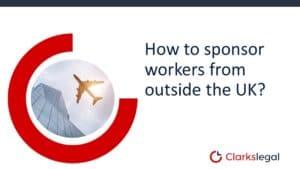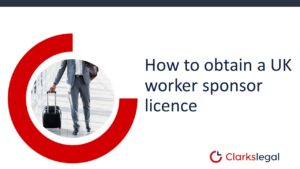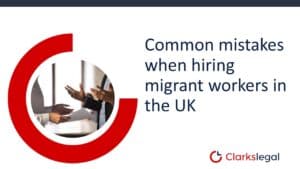Sponsoring migrant workers
The UK government strictly regulates the immigration of migrant workers to the UK. As a part of its immigration system, it requires companies to have a sponsor licence before they can employ non-settled employees who do not already hold a visa allowing them to work in the UK.
Our experienced immigration solicitors are available to offer practical, prompt and high-quality advice and support to businesses and individual clients. We can consult on your sponsor licence application queries and guide you through the convoluted process.
Once you are granted with a sponsor licence, you will be added to the Home Office’s Worker and Temporary Workers Sponsor Register and you will be given access to the Sponsorship Management System (SMS). You can then use the SMS to apply for a Certificate of Sponsorship (CoS) which if granted can be assigned to the prospective migrant employee, which is used in support of their Worker or Temporary Worker visa application.
Our specialist business immigration lawyers regularly assist sponsored employers with the preparation and submission of their sponsored worker’s visa application, along with their dependents. We are well versed in all aspects of the Points Based System (PBS) and are successful in obtaining work visas in all PBS categories.
“The team makes it very easy to ask questions and understand the advice given.”
Legal 500
FAQ – Sponsoring skilled migrant workers
It is important to understand that not all migrant workers need to be sponsored to work in the UK. This is because they may be lawfully in the UK under another immigration category which allows them to work. This could include, for example, as the spouse of a British citizen, an ancestry visa or even the dependent of a migrant who is sponsored.
However, for most migrant workers, who want to come to the UK for work, they must be sponsored. This means that they should have a job offer from a company which has a sponsor licence.
A sponsor licence is in effect an approval from the UK Home Office for an organisation to sponsor migrant workers. Organisations that can sponsor are included in a register of sponsors which is updated daily.
The UK government views its relationship with sponsors as one of trust. It allows companies to act as de facto gatekeepers to the UK work immigration route.
This licence (or relationship of trust) requires initial and ongoing validation. The initial validation comes through an application for sponsorship, and thereafter the UK Home Office may conduct occasional checks to ensure that the sponsoring company continues to abide by its sponsoring obligations.
The sponsor licence application is made online through the UK Home Office website. However, applying organisations should not make this application until they are satisfied that they have all the relevant documents.
The documents required for a sponsor licence vary depending on the type of organisation. For example, a start-up may need to show a lesser number of documents but may end up with more scrutiny at an initial and post-licence stage.
In addition to the prescriptive list provided by the Home Office, organisations intending on applying for a licence must also demonstrate that they fulfil the following criteria:
- Whether the organisation is genuine and operating lawfully in the UK, which can be demonstrated by providing documents listed in the relevant Appendices of the sponsor guidance.
- Have a Human Resources (HR) & recruitment system to meet their sponsor duties – the Home Office may conduct a compliance visit to check this
- Whether the organisation and its key personnel, are honest, dependable and reliable – the Home Office is likely to conduct background checks on the organisation and any of the key individuals to determine this.
- Whether you can offer genuine employment under the eligible roles of your intended sponsor category. It is important to note that not all employment roles are eligible for sponsorship.
Once you have taken the necessary steps and have the relevant documents, you should then complete the online application. You will have to pay the sponsor licence fee, which will vary depending on the size of your organisation.
Following the online submission, a submission sheet will be generated. This must be signed by the proposed Authorising Officer – the individual who is ultimately responsible for the management of the licence.
The standard period for a sponsor licence to be processed is 8 weeks. In our experience, most applications are decided sooner than this. If the Home Office sponsorship team need to make a compliance visit before they issue the licence, processing times may be longer. There is a Pre-Licence Priority service (an additional £500) which may be applied for which expedites the processing time to 10 working days. It is important to note that this service is highly sought for following the end of EU Settlement Scheme in June 2021, and with the service being limited to 10 requests per day, applications are accepted on a first-come, first-serve basis on each working day starting at 9am.
The approval letter is sent via email to either the Authorising Officer or Key Contact with the Level 1 User’s ID access the Sponsorship Management System (SMS).


